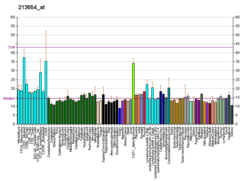TAF5L
TAF5-like RNA polymerase II p300/CBP-associated factor-associated factor 65 kDa subunit 5L is an enzyme that in humans is encoded by the TAF5L gene.[5][6][7]
Function
The product of this gene belongs to the WD-repeat TAF5 family of proteins. This gene encodes a protein that is a component of the PCAF histone acetylase complex. The PCAF histone acetylase complex, which is composed of more than 20 polypeptides some of which are TAFs, is required for myogenic transcription and differentiation. TAFs may participate in basal transcription, serve as coactivators, function in promoter recognition or modify general transcription factors to facilitate complex assembly and transcription initiation. The encoded protein is structurally similar to one of the histone-like TAFs, TAF5. Alternatively spliced transcript variants encoding different isoforms have been identified for this gene.[7]
Interactions
TAF5L has been shown to interact with TAF9[8] and Transcription initiation protein SPT3 homolog.[8]
References
- GRCh38: Ensembl release 89: ENSG00000135801 - Ensembl, May 2017
- GRCm38: Ensembl release 89: ENSMUSG00000038697 - Ensembl, May 2017
- "Human PubMed Reference:". National Center for Biotechnology Information, U.S. National Library of Medicine.
- "Mouse PubMed Reference:". National Center for Biotechnology Information, U.S. National Library of Medicine.
- Ogryzko VV, Kotani T, Zhang X, Schiltz RL, Howard T, Yang XJ, Howard BH, Qin J, Nakatani Y (Aug 1998). "Histone-like TAFs within the PCAF histone acetylase complex". Cell. 94 (1): 35–44. doi:10.1016/S0092-8674(00)81219-2. PMID 9674425.
- Stanchi F, Bertocco E, Toppo S, Dioguardi R, Simionati B, Cannata N, Zimbello R, Lanfranchi G, Valle G (Jan 2001). "Characterization of 16 novel human genes showing high similarity to yeast sequences". Yeast. 18 (1): 69–80. doi:10.1002/1097-0061(200101)18:1<69::AID-YEA647>3.0.CO;2-H. PMID 11124703.
- "Entrez Gene: TAF5L TAF5-like RNA polymerase II, p300/CBP-associated factor (PCAF)-associated factor, 65kDa".
- Martinez E, Palhan VB, Tjernberg A, Lymar ES, Gamper AM, Kundu TK, Chait BT, Roeder RG (Oct 2001). "Human STAGA complex is a chromatin-acetylating transcription coactivator that interacts with pre-mRNA splicing and DNA damage-binding factors in vivo". Mol. Cell. Biol. 21 (20): 6782–95. doi:10.1128/MCB.21.20.6782-6795.2001. PMC 99856. PMID 11564863.
Further reading
- Struhl K, Moqtaderi Z (1998). "The TAFs in the HAT". Cell. 94 (1): 1–4. doi:10.1016/S0092-8674(00)81213-1. PMID 9674419.
- Brand M, Yamamoto K, Staub A, Tora L (1999). "Identification of TATA-binding protein-free TAFII-containing complex subunits suggests a role in nucleosome acetylation and signal transduction". J. Biol. Chem. 274 (26): 18285–9. doi:10.1074/jbc.274.26.18285. PMID 10373431.
- Brand M, Moggs JG, Oulad-Abdelghani M, Lejeune F, Dilworth FJ, Stevenin J, Almouzni G, Tora L (2001). "UV-damaged DNA-binding protein in the TFTC complex links DNA damage recognition to nucleosome acetylation". EMBO J. 20 (12): 3187–96. doi:10.1093/emboj/20.12.3187. PMC 150203. PMID 11406595.
- Martinez E, Palhan VB, Tjernberg A, Lymar ES, Gamper AM, Kundu TK, Chait BT, Roeder RG (2001). "Human STAGA complex is a chromatin-acetylating transcription coactivator that interacts with pre-mRNA splicing and DNA damage-binding factors in vivo". Mol. Cell. Biol. 21 (20): 6782–95. doi:10.1128/MCB.21.20.6782-6795.2001. PMC 99856. PMID 11564863.
- Cavusoglu N, Brand M, Tora L, Van Dorsselaer A (2003). "Novel subunits of the TATA binding protein free TAFII-containing transcription complex identified by matrix-assisted laser desorption/ionization-time of flight mass spectrometry following one-dimensional gel electrophoresis". Proteomics. 3 (2): 217–23. doi:10.1002/pmic.200390030. PMID 12601814.
- Zhang K, Faiola F, Martinez E (2005). "Six lysine residues on c-Myc are direct substrates for acetylation by p300". Biochem. Biophys. Res. Commun. 336 (1): 274–80. doi:10.1016/j.bbrc.2005.08.075. PMID 16126174.
- Chistiakov DA, Chernisheva A, Savost'anov KV, Turakulov RI, Kuraeva TL, Dedov II, Nosikov VV (2005). "The TAF5L gene on chromosome 1q42 is associated with type 1 diabetes in Russian affected patients". Autoimmunity. 38 (4): 283–93. doi:10.1080/08916930500128594. PMID 16206511.
- Kuninger D, Wright A, Rotwein P (2006). "Muscle cell survival mediated by the transcriptional coactivators p300 and PCAF displays different requirements for acetyltransferase activity". Am. J. Physiol., Cell Physiol. 291 (4): C699-709. doi:10.1152/ajpcell.00056.2006. PMID 16672693.
- Okumura K, Mendoza M, Bachoo RM, DePinho RA, Cavenee WK, Furnari FB (2006). "PCAF modulates PTEN activity". J. Biol. Chem. 281 (36): 26562–8. doi:10.1074/jbc.M605391200. PMID 16829519.
- Ravnskjaer K, Kester H, Liu Y, Zhang X, Lee D, Yates JR, Montminy M (2007). "Cooperative interactions between CBP and TORC2 confer selectivity to CREB target gene expression". EMBO J. 26 (12): 2880–9. doi:10.1038/sj.emboj.7601715. PMC 1894761. PMID 17476304.




